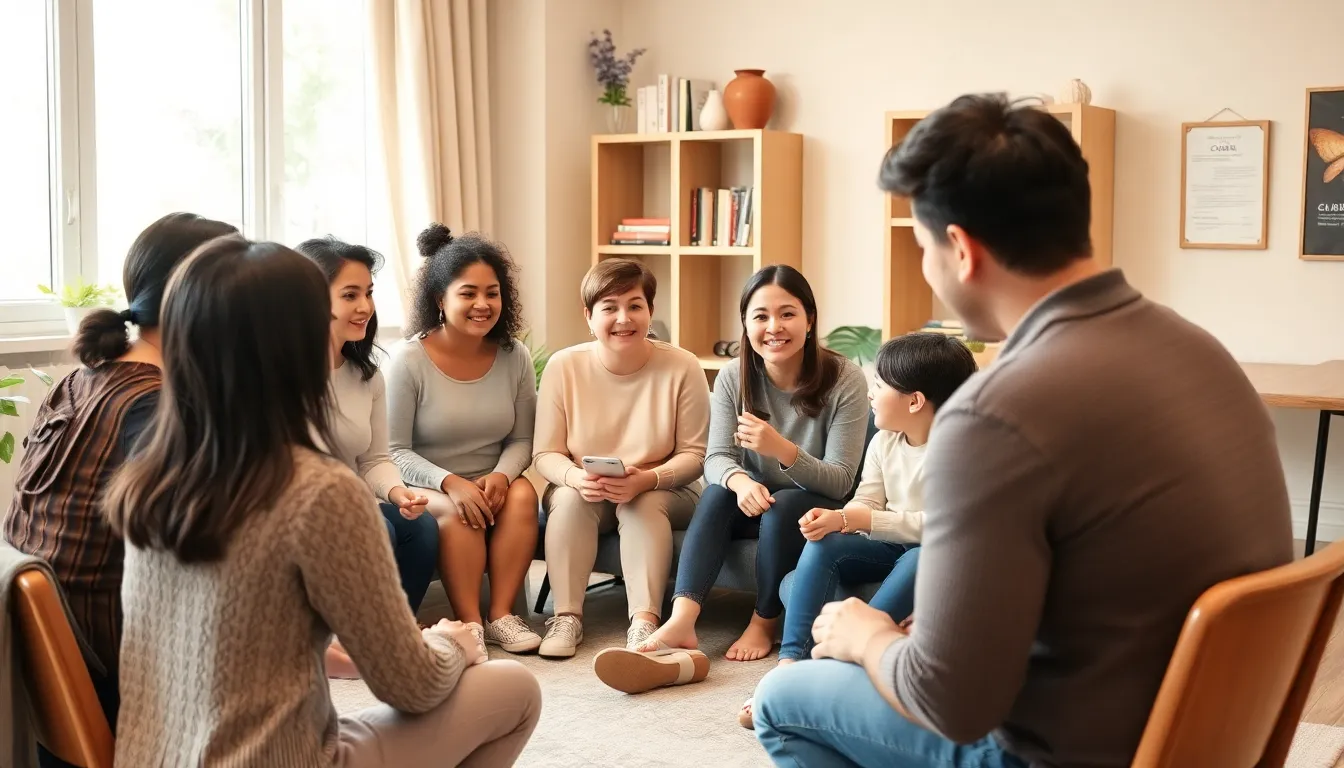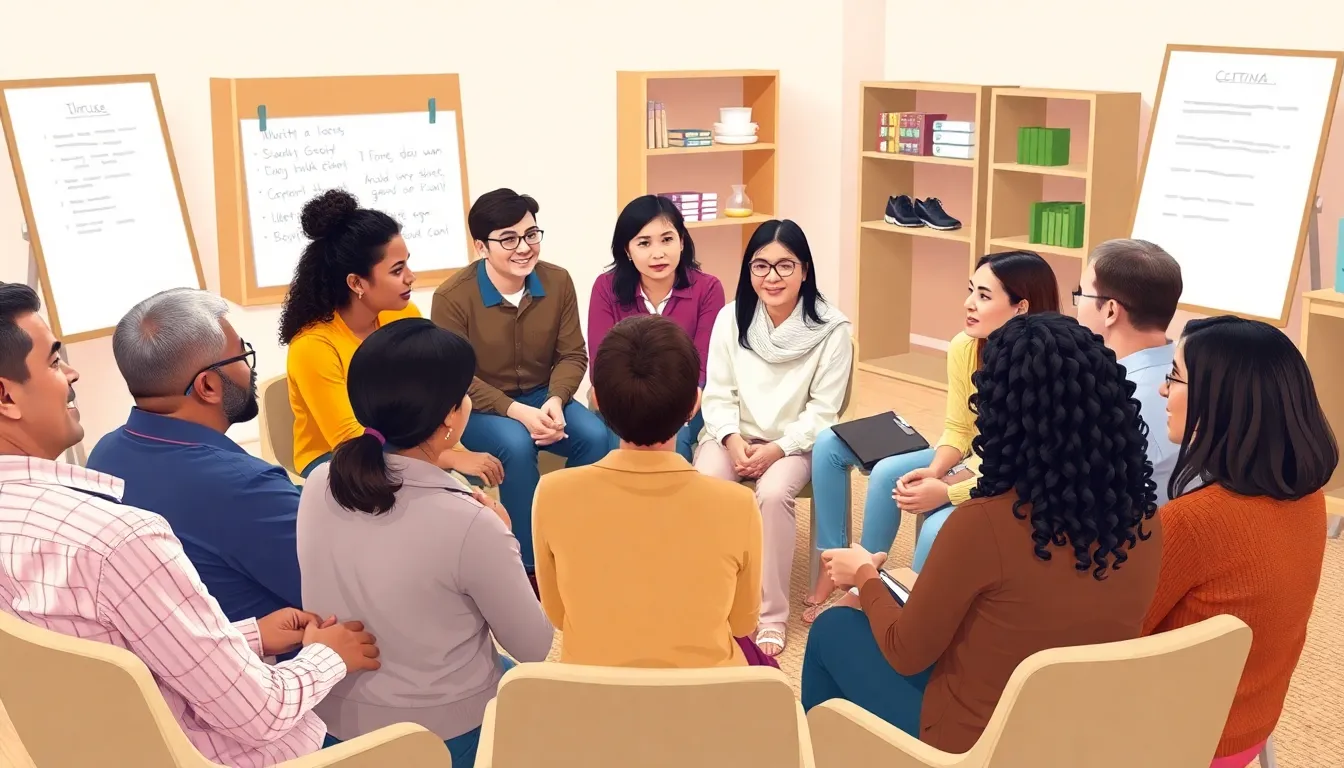Navigating the wild world of co-parenting can feel like trying to assemble IKEA furniture without the instructions—confusing and a bit frustrating. But fear not! Co-parenting classes are here to turn that chaos into a well-oiled machine. These classes offer a treasure trove of tips and tricks to help parents work together more effectively, ensuring that the kids get the best of both worlds.
Table of Contents
ToggleUnderstanding Co Parenting Classes
Co-parenting classes equip parents with essential skills for effective collaboration after separation or divorce. They focus on enhancing communication and conflict resolution strategies.
What Are Co Parenting Classes?
Co-parenting classes are educational programs designed for separated or divorced parents. These classes cover topics such as child development, emotional support, and parenting plans. Participants learn techniques to foster healthy parent-child relationships. Classes often include interactive activities that promote understanding and teamwork.
Benefits of Co Parenting Classes
Co-parenting classes improve communication between parents, reducing misunderstandings. Enhanced conflict resolution skills lead to fewer disputes about parenting decisions. Participants report increased awareness of children’s emotional needs, fostering a supportive environment. Furthermore, the classes provide practical strategies that promote collaboration, ensuring children thrive.
Types of Co Parenting Classes


Co-parenting classes come in various formats, allowing parents to choose what fits their needs best. Two popular options are in-person and online classes.
In-Person Classes
In-person classes offer direct interaction with instructors and other parents. These classes generally create a supportive environment, facilitating open discussions about co-parenting challenges. Group activities encourage participants to practice communication skills face-to-face. Local community centers or family services often host these sessions, featuring skilled facilitators who guide parents through relevant topics. Expect to find structured programs that address child development and support strategies. Such classes typically last from several hours to multiple weeks, ensuring comprehensive coverage of essential skills.
Online Classes
Online classes provide flexibility for busy parents seeking co-parenting education. Many platforms offer on-demand courses, allowing participants to learn at their own pace. These classes often include video content, quizzes, and downloadable resources for effective learning. Parents can connect with instructors and peers via forums or chat functions, enhancing the interactive experience. Most online programs incorporate lessons on communication, emotional support, and conflict resolution. As a result, parents gain invaluable insights without the need to commute, making it easier to fit education into their schedules.
How to Choose the Right Co Parenting Class
Selecting the appropriate co-parenting class requires careful consideration of several factors.
Factors to Consider
Class format plays a significant role; participants may prefer in-person settings for direct interaction or online formats for flexibility. Course content is equally important; prioritize classes covering essential topics like communication, emotional support, and child development. Instructor qualifications can also impact effectiveness; look for experienced professionals with relevant backgrounds in family therapy or child psychology. Local support networks enhance the learning experience; classes offering opportunities for discussion and peer support foster collaboration. Class duration varies; shorter sessions may suit busy schedules, while longer programs provide in-depth training.
Recommended Resources
Many resources exist for locating quality co-parenting classes. Websites like Parents Without Partners offer directories of classes tailored for separated or divorced parents. Local community centers often provide workshops focused on co-parenting skills. The National Family Resiliency Center lists online and in-person programs nationwide, making access easier. Many county family courts recommend specific programs that meet legal requirements for custody-related educational classes. Online platforms like Udemy and Coursera feature co-parenting courses with flexible schedules, appealing to those managing busy lives.
What to Expect from Co Parenting Classes
Co-parenting classes equip parents with practical skills and knowledge essential for effective collaboration. Participants can expect a structured curriculum that covers various pertinent subjects.
Curriculum Overview
Curriculum content often includes key topics such as child development, emotional intelligence, and conflict resolution. Each section aims to enhance communication strategies between co-parents. Participants learn about the importance of creating a parenting plan tailored to their family’s unique needs. Techniques for supporting children’s emotional well-being received emphasis throughout the program. Furthermore, resource materials such as workbooks or online modules reinforce classroom learning. Classes typically span multiple sessions to allow for thorough exploration of these critical areas.
Common Activities
Interactive activities are common in co-parenting classes, fostering engagement and collaboration. Role-playing exercises help parents practice effective communication in various scenarios. Group discussions also encourage sharing personal experiences and insights, enhancing peer support. Workshops may include creating visual aids for parenting plans. Participants often complete quizzes to reinforce their understanding of key concepts. Such activities help parents build relationships and prepare for future interactions. Ultimately, these experiences promote teamwork and a healthier co-parenting dynamic.
Co-parenting classes offer invaluable support for parents navigating the complexities of shared parenting. By enhancing communication and conflict resolution skills, these classes create a foundation for healthier interactions. Parents gain insights into child development and emotional support, equipping them to meet their children’s needs effectively.
Whether through in-person engagement or flexible online formats, these courses provide practical tools that foster teamwork and understanding. Choosing the right class can make a significant difference in co-parenting dynamics. Ultimately, investing time in co-parenting education is a step toward creating a nurturing environment for children to flourish.









